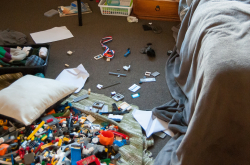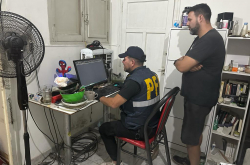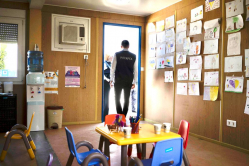Today, ECPAT, INTERPOL, and the UNICEF Office of Research – Innocenti, with support from Safe Online at the End Violence Partnership, release Disrupting Harm in Kenya.
The Disrupting Harm in Kenya report details comprehensive evidence of the risks children face online, how they develop, how they interlink with other forms of violence and what we can do to prevent them. Most children who experienced some form of online child sexual exploitation and abuse (e.g., grooming, coercion, or blackmail to send sexual images, live streaming, etc.) have also experienced in-person physical, sexual, or emotional abuse.
Key findings from Disrupting Harm research in Kenya found:
- Between 5 and 13 per cent of internet-using children, aged 12-17, reported experiencing online child sexual exploitation and abuse (OCSEA*) in the past year. However, it is believed this number is likely higher as many children do not disclose.
- Less than 5 per cent of children who were subjected to OCSEA in the past year say they formally reported to the police or a national helpline.
- 7 per cent of children have had their sexual images shared with others without their consent, in the past year alone. This represents an estimated 350,000 children per year in Kenya.
- 7 per cent of children said they had been offered money or gifts in return for sexual images or videos of themselves in the past year.
- 4 per cent had been threatened or blackmailed online to engage in sexual activities in the past year. Threats and requests like these are made to both boys and girls, often via social media.
- In Kenya, there are almost no gender differences in children’s experience of OCSEA; boys and girls are both subjected to these crimes.
- Perpetrators are most often someone the child already knows.
The Disrupting Harm in Kenya report provides actionable recommendations for the government, lawmakers, industry, and other actors in Kenya to strengthen the national prevention and response to this crime. The report shows that some forms of OCSEA are not treated as criminal offences in Kenyan law. Most incidents go unreported, most commonly due to fears of stigmatization. When children do tell someone about their experiences, they often share only with someone they know and trust. This is not uncommon as violence against children goes unreported in most countries.
The research also found that the Kenyan government already has strong programmes in place to address OCSEA and support survivors. The Government of Kenya is launching its new National Plan of Action on Online Child Sexual Exploitation and Abuse in the coming months, signalling strong political will and commitment to tackle these crimes against children.
As a result of the research, Disrupting Harm in Kenya provides practical suggestions for national partners, industry, and the Government of Kenya, including:
- Strengthen and diversify mechanisms for children to disclose concerns, report incidents and seek help and advice, including through simple, child-friendly, online methods. Ensure that all responses to OCSEA refrain from blaming the child.
- Inform the public of the topic of sexual exploitation and abuse of children – including the role of technology – through effective, widespread programmes.
- Teach caregivers to talk to children about their lives (online and offline), and challenge taboos that prevent children and adults from talking about sex or from seeking help.
- Introduce legislation and policy that will ensure social media platforms and other internet services actively contribute to the safety of children on their platforms, through data retention, removal of access to child sexual abuse materials, detection and report of incidents and promptly complying with law enforcement warranted requests for information.
- Provide public financial support to the national children’s helpline Childline Kenya to ensure its sustainability and improve its ability to provide psychosocial support to children, including for OCSEA related issues.
- Provide all children reporting sexual exploitation and abuse, and their caregivers, with quality services including a standard information package about their rights, including any right to compensation, and the procedures that will be followed.
“I am encouraged by the Government of Kenya’s preparation of a National Plan of Action to tackle child sexual abuse. With this in mind, it's great to see the first Disrupting Harm in Kenya country report published today. Disrupting Harm in Kenya provides new evidence and data to inform action to make the internet safe for Kenyan children, including safety from online sexual abuse and exploitation,” said Howard Taylor, Director of the Global Partnership to End Violence against Children.
“The End Violence Fund will invest $15 million USD to support implementation of the findings of Disrupting Harm country reports in Southeast Asia and Eastern and Southern Africa, including Kenya."
In 2019, the End Violence Partnership, through its Safe Online initiative, invested to develop Disrupting Harm, a holistic and innovative research project delivered by ECPAT, INTERPOL, and the UNICEF Office of Research – Innocenti, which uniquely applies the specific expertise of these three global agencies and their local partners.
This is the first of a series of 13 country reports and two regional reports due to be published soon. Similar assessments have been carried out in 12 other Eastern and Souththern African and Southeast Asian countries, allowing for cross-country comparisons.
-----------------------------------------------------------------------------------------------------------------------------------------------------
(*) Definition of OCSEA: Online child sexual exploitation and abuse (OCSEA) refers to situations involving digital, internet and communication technologies at some point during the continuum of abuse or exploitation. OCSEA can occur fully online or through a mix of online and in-person interactions between offenders and children.









